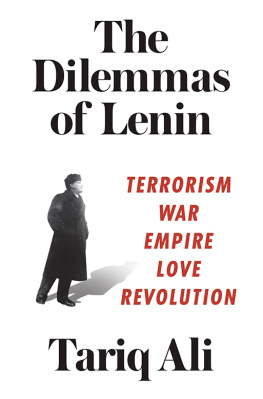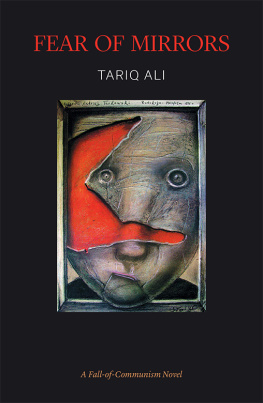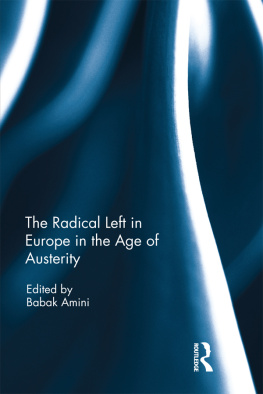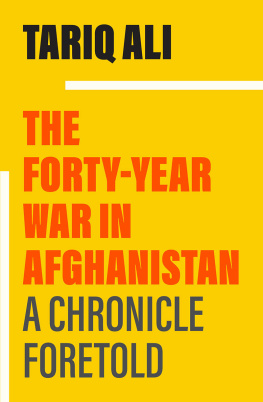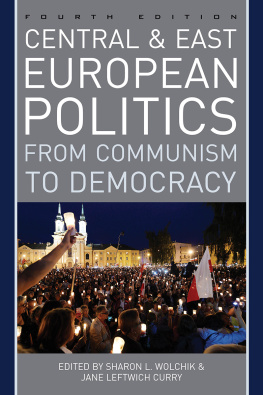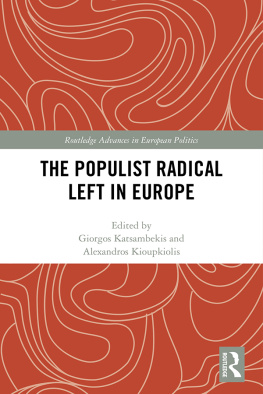Ali, Tariq.
The extreme centre : a warning / Tariq Ali.
pages cm
Includes bibliographical references and index.
1. World politics1989 2. World politicsForecasting. 3. Center partiesWestern countries. 4. DemocracyWestern countries. 5. Political cultureWestern countries. 6. CapitalismPolitical aspectsWestern countries. 7. Populism. 8. Revolutions. 9. Great BritainPolitics and government2007 10. Western countriesPolitics and government. I. Title. II. Title: Extreme center.
Democracy is in serious trouble, especially in its European heartlands. In the United States the citizens have, more or less, accepted a broken system for over a century. A sizeable percentage of the electorate has accustomed itself to not voting, a form of passive protest and a recognition that the system is pretty much corrupt.path, with this exception: whereas US politics is petrified, in a number of European countries challenges to the existing structures are emerging.
As to Americas two British-fathered siblings, Canada has adopted the US as its new parent and is adjusting accordingly; Australian politics has been in an advanced state of decay ever since the late Gough Whitlam, the prime minister, was removed via an intelligence coup masterminded in London. The country now specializes in battery-farming provincial politicians of a provincial cast with impressive regularity. In all these locations, citizens deserve better.
Twenty-five years ago when the Berlin Wall came down, it was not simply the Soviet Union or the communist idea or the efficacy of socialist solutions that collapsed. Western European social democracy, too, went down. In the face of the triumphalist capitalist storm that swept the world, it had neither the vision nor the determination to defend elements of its own past social programmes. It decided, instead to commit suicide. This was the founding moment of the extreme centre.
In 2000, social democratic parties or coalitions dominated by them governed most of Western Europe, barring Spain. The experience confirmed that none of these parties could deliver effective policies that improved the living conditions of the majority of electors whose votes had placed them in power. Capitalism, intoxicated by its victory and unchallenged from any quarter, no longer felt the need to protect its left flank by conceding any more reforms. Even a marginal redistribution of wealth to reduce inequalities was off the agenda.
Under these conditions, social democracy became redundant. All it could offer its traditional supporters was fear, or vacuous ideological formulae, whose principal function was to conceal the poverty of any real progressive ideas: third way, conflict-free politics, beyond left and right. The net result of this was either an electoral shift towards the far right (of which Austria was an early European example) or an increasing alienation from politics and the entire democratic process. In other words, an increasing Americanization of European politics offering a Tweedledee or Tweedledum choice with a decline of the popular vote. With popular culture so heavily Atlanticized, politics could not be far behind. Nowhere in Western Europe did a social democratic party capitulate so willingly and completely to the needs of a deregulated capitalism and imperial wars as the Labour Party of Brown and Blair in the United Kingdom.
The successors of Reagan and Thatcher were and remain confected politicians: Blair, Cameron, Obama, Renzi, Valls, and so on, share an authoritarianism that places capital above the needs of citizens and uphold a corporate power rubber-stamped by elected parliaments. The new politicians of Europe and America mark a break with virtually every form of traditional politics. The new technology has made ruling by clique or committee much easier.
They are immured in exclusive bunkers accessible only to bankers and businessmen, servile media folk, their own advisers and sycophants of various types. They live in a half-real, half-fake world of money, statistics and focus groups. Their contact with real people, outside election periods, is minimal. Their public face is largely mediated via the mendacious propaganda of the TV networks, or photo opportunities that sometimes go badly wrong. They refuse to step down and talk to the people whose worlds they have destroyed.
In power they tend towards paranoia, treating any serious criticism as disloyalty, and grow increasingly dependent on spin doctors who themselves behave and are treated like celebrities. Since political differences are minimal, power becomes an end in itself and a means to acquiring money and well-paid consultancies after leaving office. Today the symbiosis between power and money has almost everywhere reached unbelievable extremes. The cowed and docile politicians who work the system and reproduce themselves are what I label the extreme centre of mainstream politics in Europe and North America.
This book concentrates on the British segment, for a variety of reasons. I live here and have done so for half a century, but there are other, more important factors. This was, after all, the first country in Europe to implement the new consensus, later to be mimicked to varying degrees elsewhere, with Sweden in the lead.
Thatcher and her successors acted with the electoral support of sections of the traditional working classes, especially but not only in the Midlands, and in part with the help of oil revenues garnered from Scottish shores. Working-class Toryism was never absent in England, but it grew rapidly under Thatcher. A divided working class and an undemocratic electoral system provided the basis for Thatchers dismantling of the 1945 reforms. She questioned the meaning of society and worked to encourage individualism and consumerism.
Each for oneself was her motto. This notion, hardly new, and the ideological offensive to which it was coupled, led to a profound shift in consciousness, a mental and moral upheaval, which was fuelled initially by the privatization of public housing and later by the institutionalization of household debt via easy mortgages and borrowing facilities designed to aid the new consumerism.



